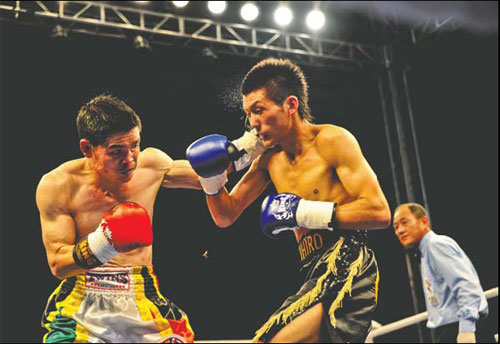On screen, Chinese boxers fight for glory - and themselves
Updated: 2012-08-31 11:31
By Kelly Chung Dawson in New York (China Daily)
|
||||||||
|
Boxer Qi Moxiang fights Akihiro Matsumoto of Japan in a 2001 bout in Huili County, Sichuan province, that is chronicled in the documentary China Heavyweight, directed by Yung Chang. Liu Yang For China Daily |
Boxing was banned in China in 1959, criticized as brutal and capitalistic. The ban wasn't lifted until after Muhammad Ali visited the country 20 years later, leading Deng Xiaoping to declare, "If we want to win friends, if we want to win respect, we have to win medals."
In 1987 the China Boxing Association was founded, restoring the sport to official status and opening the ring to amateur and professional fighters.
Deng's words resonate today in the extreme reverence paid to Chinese Olympic champions, who are treated as national heroes. Participation in international sports competitions has become an important public symbol of China's standing in the world.
It is within this context that Yung Chang, the Chinese-Canadian director of the award-winning 2007 documentary Up the Yangtze, set out to make a film about boxing, a sport that is by nature fiercely individualistic.
In China Heavyweight, which was screened at New York's Symphony Space on Aug 12, a coach tells prospective boxers: "You will be the country's official athletes. You will be the country's people. If you don't train hard, you'll end up growing tobacco. Then you won't be anyone but your mama's kid."
For so many young Chinese boxers - often recruited in adolescence - the sport represents a chance to rise up in the world and escape the field work to which their parents are bound.
In Huili County, we meet Miao Yunfei, who idolizes "boxing kings" like Mike Tyson and Manny Pacquiao. "I don't want to stay in this backward place," he tells his parents. He Zongli, whose emotional strength is called into question by his coaches, yearns for Olympic glory. Both train under Qi Moxiang, who nurses his own boxing dreams even as he cautions his charges against being too driven by glory.
"I realized there was a bigger story to tell here," Chang told China Daily. "To me, it seems to mirror the notion of the rise of the individual in China. It is an individualistic endeavor, in a country that is rapidly undergoing change."
Chang recounted the words of a professional coach. "He told me that when he recruits fighters, he always asks them, 'Who are you fighting for?' If they say they're fighting for their country, he shows them the way out. If they say they're fighting for themselves, they're allowed to continue training."
And yet for those who remain on the amateur circuit, training remains a collective undertaking, with fighters living and boxing together as a unit in government facilities.
"In China, competing for national excellence is almost a religion," said China Heavyweight producer Yi Han in an interview with China Daily. "But with boxing, the bottom line is that you're fighting for yourself. When a boxer steps into the ring, he's defending and fighting for himself, not anyone else.
"As the boxers in the film come of age, should they fight for the collective good as amateurs or for their personal grain as professionals? The story is a metaphor for nationalism versus individualism that everyone faces in China," Yi said.
This conflict is central to the development of young boxers, explained Chang. "On one level they are sacrificing for their country, on another level for their family, and then on the next level for themselves," he said.

 Relief reaches isolated village
Relief reaches isolated village
 Rainfall poses new threats to quake-hit region
Rainfall poses new threats to quake-hit region
 Funerals begin for Boston bombing victims
Funerals begin for Boston bombing victims
 Quake takeaway from China's Air Force
Quake takeaway from China's Air Force
 Obama celebrates young inventors at science fair
Obama celebrates young inventors at science fair
 Earth Day marked around the world
Earth Day marked around the world
 Volunteer team helping students find sense of normalcy
Volunteer team helping students find sense of normalcy
 Ethnic groups quick to join rescue efforts
Ethnic groups quick to join rescue efforts
Most Viewed
Editor's Picks

|

|

|

|

|

|
Today's Top News
Health new priority for quake zone
Xi meets US top military officer
Japan's boats driven out of Diaoyu
China mulls online shopping legislation
Bird flu death toll rises to 22
Putin appoints new ambassador to China
Japanese ships blocked from Diaoyu Islands
Inspired by Guan, more Chinese pick up golf
US Weekly

|

|







